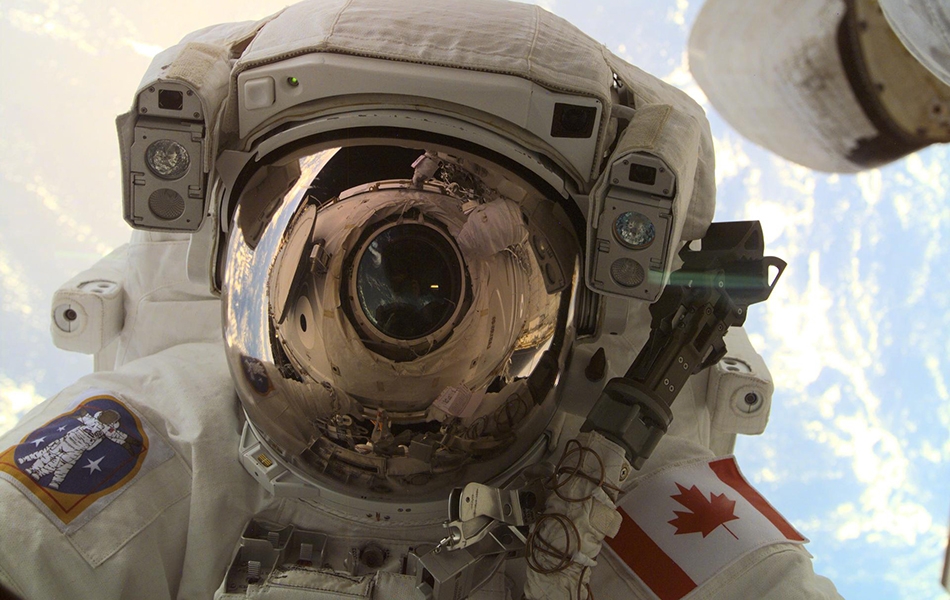
“Right after I landed, I could feel the weight of my lips and tongue and had to change how I was talking. I didn't realize I had learned to talk with a weightless tongue."
Science has studied the effects of lower gravity on the body, but this comment by Commander Chris Hadfield at a press conference prompted University of British Columbia linguists to investigate how space travel might affect astronauts’ speech.
Department of Linguistics professor Bryan Gick and doctoral student Arian Shamei, both Language Sciences members, discuss how vowels produced by astronauts change after a spell in space, and what this tells us about the future of speech in changing gravity.
How did this study come about? What novel results did you find?
BG: Shortly after Chris Hadfield’s landing in 2013, my colleague Carla Hudson Kam mentioned Hadfield’s comments. I have a long-standing interest in the physical mechanisms of speech, so I ran to my computer and wrote up a proposal for a series of studies and a possible grant. It took me several years to find the right circumstances – and the right collaborator – to follow up with a pilot study.
AS: Using NASA audio files from the STS-134 mission in 2011, we measured formant values for five vowels produced by astronaut Mark Kelly before, during, and after the mission. Formant values are correlated to the position of a speaker’s tongue during speech, including height. We found that all vowels were lowered and centralized for post-flight conditions, meaning astronauts speak as if their tongues are effectively heavier upon return from space. Speech sounds requiring upward movements of the tongue were particularly impaired, as these movements are more affected by the force of gravity. This reflects Chris Hadfield’s observations.
Given what we already know about muscle atrophy in low gravity, why is this finding important?
BG: There are many things we don’t understand about the effects of gravity on the body. One of those is on fine motor control – the tiny movements we use for important tasks like speech, facial expression, writing, and so on. We also understand very little in general about adaptation to any kinds of environmental or physical change. This study tells us important information about how our bodies – and specifically how our essential communicative systems – respond to changing circumstances. One thing we do know is that when our production (action) systems are perturbed, this can also change our perceptual (sensory) systems, so this gravitational effect may be affecting not only how we produce speech, but also how we perceive it.
AS: We may know lots about the effects of muscle atrophy in low gravity, but we know very little about how this would affect speech.
Since speech movements are some of the most precise and rapid motor movements undertaken at any time, it gives us a very clear picture of what’s going on in the body following some change to the speaker’s physical and emotional state. Some recent work I published found that the temporal co-ordination of speech movements are severely impaired when someone is intoxicated from cannabis consumption, and that long-term users of cannabis demonstrate these effects even when sober. Speech tells us a lot more about the speaker than what they are actually saying.
What does this mean for humans in space – should astronauts on the ISS be performing tongue exercises?
BG: If gravity changes the way we produce – and potentially perceive – speech, and these effects are most pronounced during mission-critical periods of gravitational change when spoken communication is most essential, then this is certainly something the world’s space agencies should make every effort to understand and mitigate where possible. The next steps would be to outline for the agencies a range of follow-up studies of speech perception and production and other fine motor control under varying gravitational conditions.
This study was published in October in Canadian Acoustics.
Image credit: 'View of STS-100 MS Hadfield during EVA 1 at Destiny laboratory window', NASA. Blurb excerpt: A through-the-window view of astronaut Chris A. Hadfield, STS-100 mission specialist representing the Canadian Space Agency, was taken during the first extravehicular activity of the STS-100 mission.